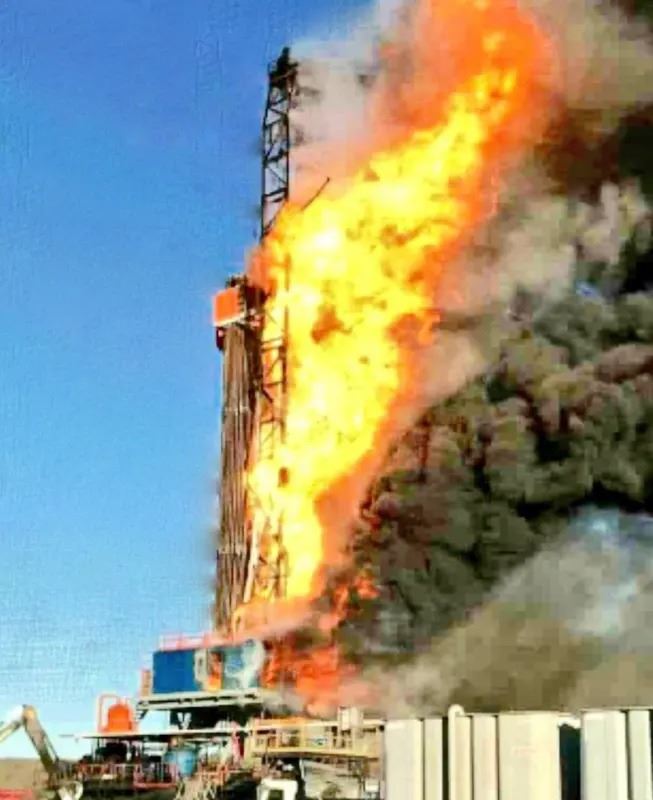A lawsuit filed in October 2018 alleges that the Quinton, Oklahoma oil rig explosion and fire that killed five men in January 2018, occurred during a risky drilling operation after the company ignored signs of impending danger. The accident claimed the highest death toll in a single drilling event since the 2010 deepwater Horizon explosion that killed 11 workers and precipitated a disastrous spill in the Gulf of Mexico.
A Houston-based company, Patterson-UTI Energy was drilling for Red Mountain, the owner and operator of the well, when an “uncontrolled release of gas... caught fire.” According to a report by Oklahoma News 4, the five men ranged in age from 26 to 60 years old and “died of burns and smoke inhalation.”
The lawsuit filed on behalf of the youngest slain worker, Cody Risk, and his family in Pittsburg County District Court “claims that the explosion was a direct result of the companies trying to save money and impress investors.” The complaint claims the incident was “preventable” and accuses the “irresponsible companies” of putting “money and profit over safety and human life.”
At the heart of the case is a decision to “use a lighter drilling mud than what other operators in the area were using,” allegedly “in an effort to save money.” The lawsuit asserts, “Red Mountain chose to ignore the proven and successful drilling programs ... when they prepared the drilling program .... Rather than ... the mud weight proven to be safe and effective in dozens and dozens of other Woodford Wells, Red Mountain chose to use a significantly lighter mud weight that was cheaper and ineffective to control the well.
Unconscionably, for the five men who lost their lives, Red Mountain cared more about its investors' money than the safety of the men who were drilling this well.” As a consequence, the “mud ... was not heavy enough to create a barrier to prevent the influx of pressure into the wellbore.” Put simply, the companies “chose a mud weight that would actually allow the well to blow-out.”
In addition to this central accusation, the lawsuit alleges “that the man serving as the drilling engineer was not a licensed engineer in Oklahoma at the time of the explosion.”
But perhaps most critically, the lawsuit alleges that when the Patterson crew on the rig asked officials to increase the mud weight, hours before the explosion, their requests were ignored. The results were catastrophic, according to the lawsuit, which states "Because the mud weight used was not heavy enough to control the well, the well began to flow in an uncontrolled manner, and the natural gas was released from the well, it mixed with oxygen in the atmosphere which then ignited causing a well fire."
The lawsuit seeks compensatory damages for Mr. Risk and his family, as well as punitive damages for an amount equal to 25 percent of the defendant companies’ net worth.
Defendant company Red Mountain has publicly denied the accusations of negligence, stating “The ... lawsuit ... contains many false allegations and unproven assertions.” Red Mountain President Tony Say denies “categorically” that “our company put profits over people,” adding, “Safe, responsible operations are the top priority at every Red Mountain well, and our deepest sympathies go out to those affected by this tragedy.”
Mr. Say claims, “As is standard in the industry, the drilling program was designed with a range of options which on-site personnel could use to perform their duties.” He blamed, “negligence by personnel from other companies who were responsible for maintaining control of the well in all circumstances.”
Mr. Say may have support for his finger-pointing. As KFOR reports, “In August, the U.S. Department of Labor’s Occupational Safety and Health Administration cited Patterson-UTI Drilling, Crescent Consulting LLC and Skyline Directional Drilling LLC for exposing workers to explosion hazards.” The safety violations include:
- Failing to maintain proper controls while drilling a well
- Failing to inspect slow descent devices
- Failing to implement emergency response plans
- Failing to ensure that heat lamps in use were approved for hazardous locations
The three companies face fines of more than $118,000.
However, their civil liability for wrongful death could amount to tens of millions. Oklahoma’s wrongful death statute allows a personal representative of the decedent’s estate to recover damages on behalf of the deceased for:
- Pain and suffering endured between the final injury or illness and the death, and
- Loss of wages and benefits the deceased would likely have earned if he had lived
Given that the men died from burns and smoke inhalation, a jury could award substantial sums for pain and suffering. Considering Mr. Risk’s young age at the time of his death, plaintiffs would be able to claim about 40 years’ worth of lost wages and benefits.
Surviving family members can also claim damages for losses such as grief and loss of companionship, and reasonable funeral and burial expenses. The statute also allows the court to impose punitive damages, if a defendant’s conduct is particularly egregious.


